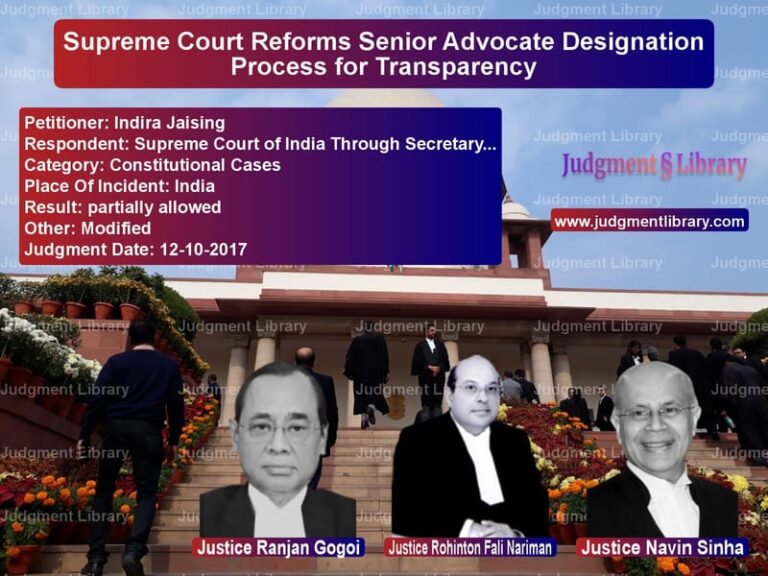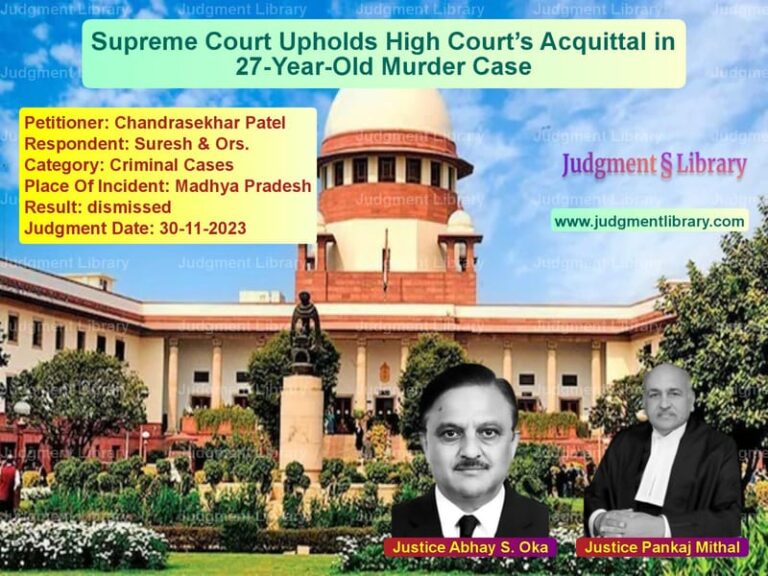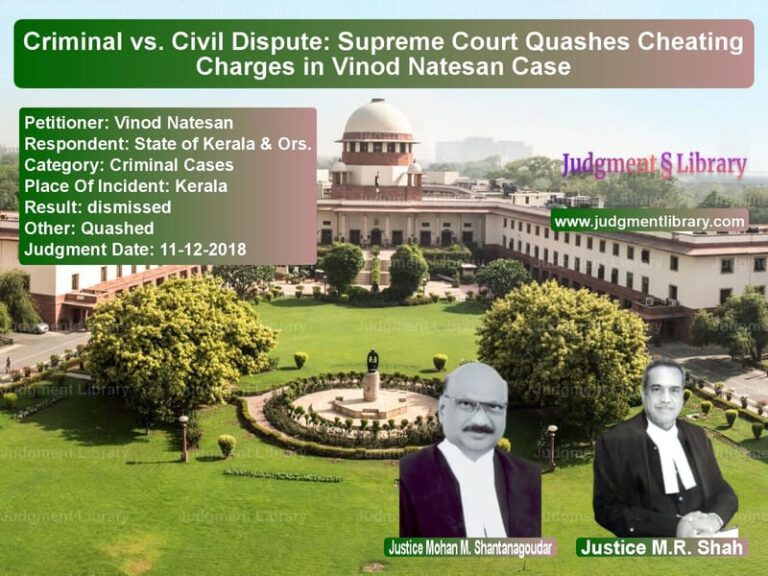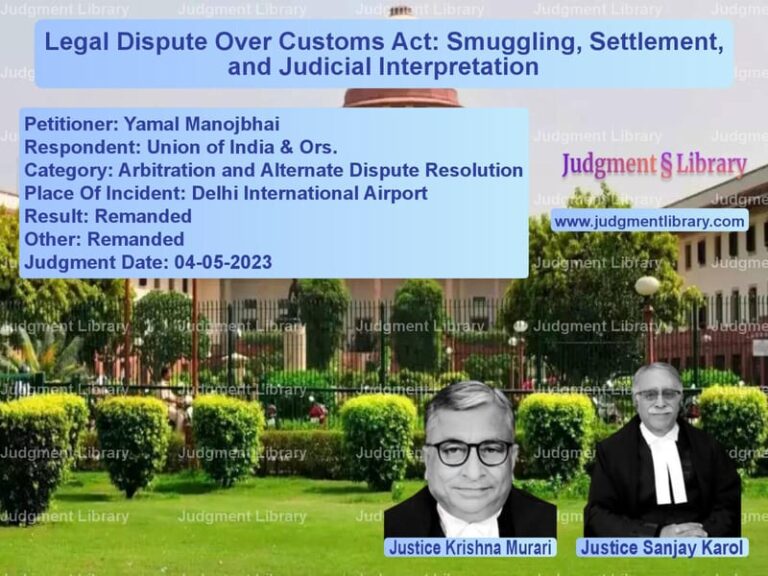Cheque Bounce Case: Supreme Court Rules on Liability of Authorized Signatory
The case of Bijay Agarwal vs. M/s Medilines revolved around a legal dispute concerning the dishonor of cheques under Section 138 of the Negotiable Instruments Act, 1881 (NI Act). The Supreme Court had to decide whether an authorized signatory of a company could be held personally liable for a dishonored cheque and whether they could be directed to deposit a portion of the fine or compensation during an appeal against conviction.
Background of the Case
The dispute originated from a business transaction between the complainant, M/s Medilines, and M/s Gee Pee Infotech Pvt. Ltd., where the appellant, Bijay Agarwal, was the authorized signatory of the company. The facts of the case are as follows:
- M/s Gee Pee Infotech Pvt. Ltd. was accused of supplying fake BSNL recharge pins to the complainant after receiving an advance payment of Rs. 1 crore.
- After complaints from customers, the complainant discovered that 99% of the recharge pins supplied were invalid.
- The complainant demanded repayment, leading to the execution of a Memorandum of Understanding (MoU) on April 10, 2012, where the accused agreed to return the money.
- The accused issued five post-dated cheques, including a cheque for Rs. 25 lakhs, which was dishonored due to a ‘payment stopped by drawer’ instruction.
- The complainant, after issuing a legal notice, filed a case under Section 138 of the NI Act for dishonor of the cheque.
Trial Court’s Decision
The case was taken on record as CC No. 13938 of 2013. The Trial Court, after examining the evidence, found that:
- The accused had indeed issued the cheque knowing that it would not be honored.
- The complainant had been deprived of its money for a prolonged period.
- The accused was convicted under Section 138 of the NI Act and was sentenced to pay a fine of Rs. 40 lakhs, with a default clause of six months’ simple imprisonment.
Appeal Before the Sessions Court
The appellant, Bijay Agarwal, filed an appeal before the Principal City Civil and Sessions Judge at Bangalore, challenging the conviction. During the appeal proceedings:
- The Sessions Court suspended the sentence on the condition that the appellant deposits 20% of the fine/compensation amount (Rs. 8 lakhs).
- The appellant challenged this condition before the Karnataka High Court.
High Court’s Decision
The Karnataka High Court dismissed the appellant’s plea and upheld the Sessions Court’s order, requiring the deposit of 20% of the fine amount as a condition for suspension of sentence.
Legal Issues Considered by the Supreme Court
- Whether an authorized signatory of a company could be considered the drawer of a cheque.
- Whether the appellant could be directed to deposit 20% of the fine under Section 148 of the NI Act while appealing against conviction.
- Whether the High Court and Sessions Court had correctly applied the law in imposing the deposit condition.
Petitioner’s Arguments
The appellant, Bijay Agarwal, argued:
- He was merely an authorized signatory of M/s Gee Pee Infotech Pvt. Ltd., and the company was the actual drawer of the cheque.
- Under the ruling in Shri Gurudatta Sugars Marketing Pvt. Ltd. vs. Prithviraj Sayajirao Deshmukh, an authorized signatory cannot be treated as a drawer for the purpose of imposing penalties under Section 148 of the NI Act.
- Requiring him to deposit 20% of the fine was legally unsustainable since he was not personally liable.
Respondent’s Arguments
The complainant, M/s Medilines, countered:
- The appellant had signed the cheques on behalf of the company, making him responsible under the NI Act.
- Section 148 of the NI Act permits courts to order the drawer of the cheque to deposit at least 20% of the fine during appeal.
- The High Court correctly held that the signatory of the cheque is accountable for ensuring its honor.
Supreme Court’s Observations
1. Distinction Between a Drawer and an Authorized Signatory
The Court analyzed Sections 143A and 148 of the NI Act and noted:
“The term ‘drawer’ in Section 148 refers specifically to the issuer of the cheque, not merely an authorized signatory acting on behalf of a company.”
Relying on the Shri Gurudatta Sugars Marketing Pvt. Ltd. case, the Court reaffirmed that an authorized signatory does not automatically assume the company’s liability.
2. No Justification for Deposit Requirement
The Court ruled that the lower courts wrongly applied Section 148 by requiring the appellant to deposit 20% of the fine:
“An authorized signatory, by itself, is not the drawer of the cheque under Section 148, NI Act, and therefore cannot be directed to deposit compensation.”
3. Quashing of High Court and Sessions Court Orders
The Supreme Court found that the High Court and Sessions Court failed to consider the distinction between a drawer and an authorized signatory:
“The High Court has failed to consider these crucial aspects in the light of the established legal principles.”
Final Judgment
The Supreme Court ruled:
- The appeals were allowed, and the High Court’s decision was set aside.
- The requirement to deposit 20% of the fine as a condition for suspending the sentence was quashed.
- The appellant’s sentence suspension remains in force without the deposit condition.
- The First Appellate Court was directed to expedite the appeal proceedings.
Conclusion
The Supreme Court’s ruling in Bijay Agarwal vs. M/s Medilines establishes important legal principles regarding cheque dishonor cases:
- An authorized signatory is not personally liable under Section 148 of the NI Act.
- Court orders requiring deposit of compensation must be applied only to the actual drawer of the cheque.
- Companies bear primary liability for dishonored cheques, not individual signatories.
This judgment reinforces the importance of correctly applying legal provisions and ensures fairness in financial disputes involving corporate entities.
Petitioner Name: Bijay Agarwal.Respondent Name: M/s Medilines.Judgment By: Justice C.T. Ravikumar, Justice Sanjay Karol.Place Of Incident: Bangalore, Karnataka.Judgment Date: 21-10-2024.
Don’t miss out on the full details! Download the complete judgment in PDF format below and gain valuable insights instantly!
Download Judgment: bijay-agarwal-vs-ms-medilines-supreme-court-of-india-judgment-dated-21-10-2024.pdf
Directly Download Judgment: Directly download this Judgment
See all petitions in unfair trade practices
See all petitions in Corporate Compliance
See all petitions in Contract Disputes
See all petitions in Banking Regulations
See all petitions in Judgment by C.T. Ravikumar
See all petitions in Judgment by Sanjay Karol
See all petitions in allowed
See all petitions in Quashed
See all petitions in supreme court of India judgments October 2024
See all petitions in 2024 judgments
See all posts in Corporate and Commercial Cases Category
See all allowed petitions in Corporate and Commercial Cases Category
See all Dismissed petitions in Corporate and Commercial Cases Category
See all partially allowed petitions in Corporate and Commercial Cases Category







